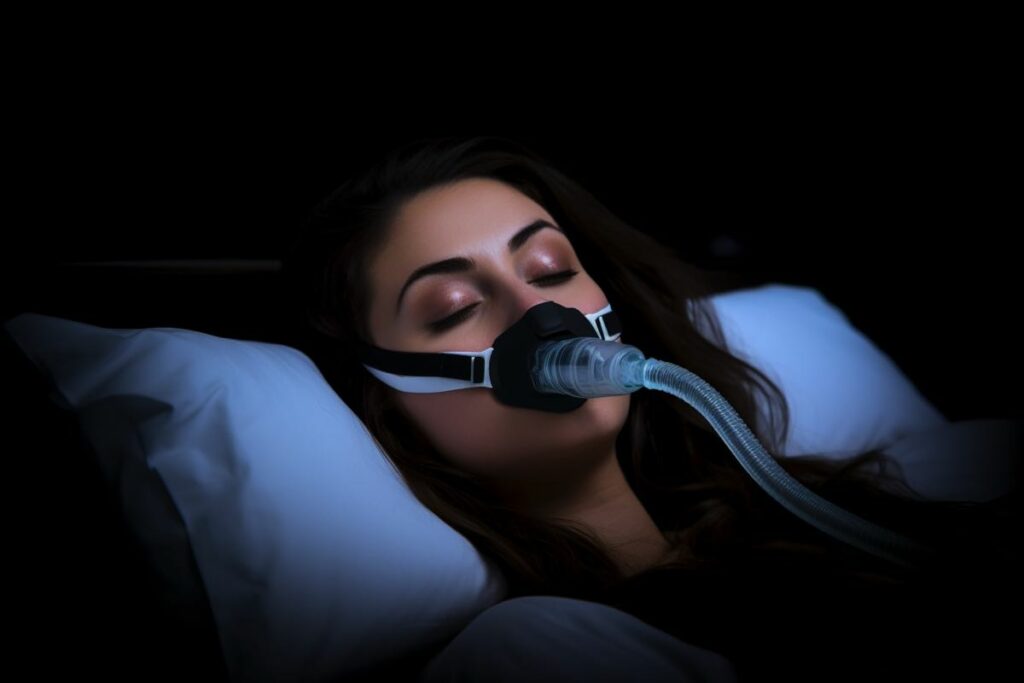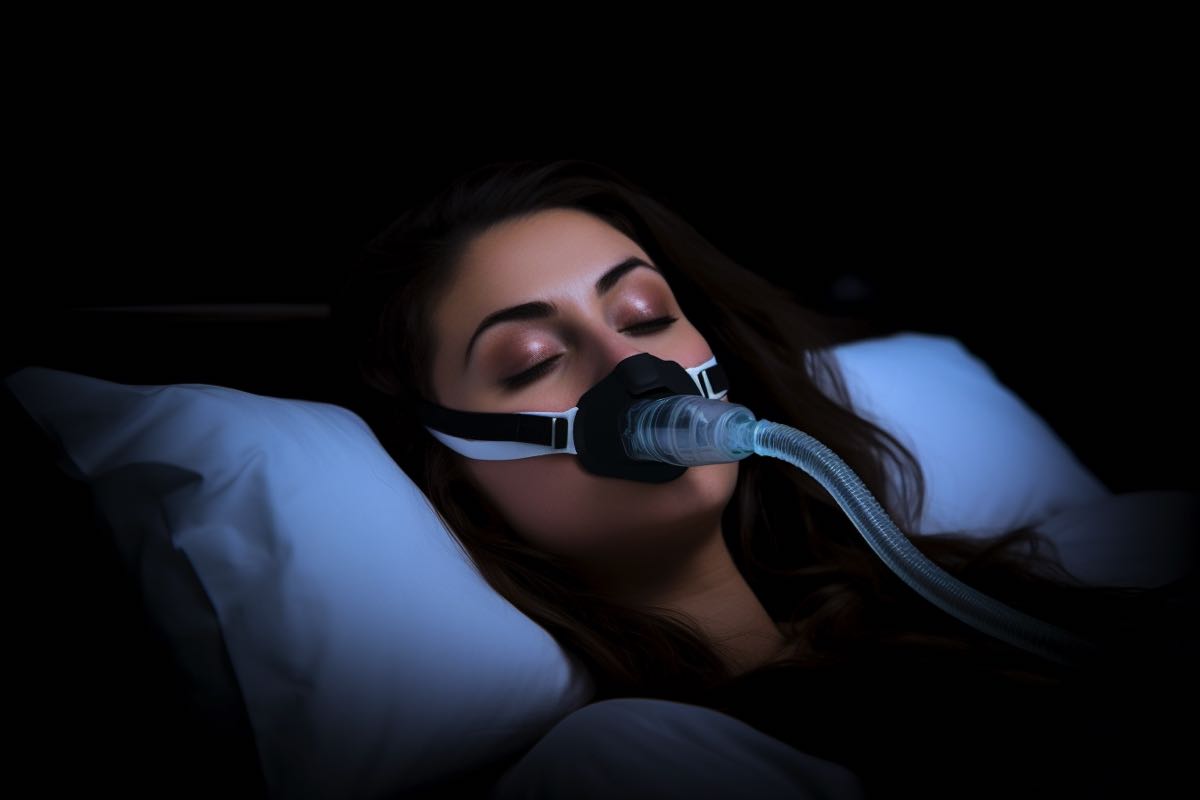Have you ever woken up feeling groggy and tired, wondering why a full night’s sleep didn’t leave you refreshed? I know I have, and let me tell you, it led me on a quest to figure out what was wrong.
After some digging and talking to my doctor, I discovered that I might have a condition called sleep apnea. It’s more common than you’d think, affecting millions of people worldwide.

If you’re in the same boat as me, you’ve probably found yourself asking: ‘How do I find out if I have sleep apnea?’ Well, my fellow sleep enthusiasts, this article is here to help guide you through the process of identifying whether or not you have this sneaky sleep-disrupting disorder.
So grab your favorite pillow and snuggle in for an informative read!
Recognizing Common Symptoms
Recognizing common symptoms of sleep apnea is essential in determining if you may have this sleep disorder.
It’s important to pay close attention to the severity of your symptoms and any potential apnea triggers that could be affecting your sleep quality.
Some common signs of sleep apnea include loud snoring, gasping or choking during sleep, waking up with a dry mouth or sore throat, and feeling excessively tired during the day despite getting enough hours of sleep.
It’s also helpful to consider any factors that might increase your risk for developing sleep apnea, such as obesity, family history of the disorder, or lifestyle habits like smoking and alcohol consumption.
By identifying these potential triggers and monitoring your symptom severity, you’ll be better equipped to discuss your concerns with a healthcare professional who can guide you in determining if further evaluation and testing are warranted.
Don’t let poor sleep quality hold you back from living your best life – take action today!
Assessing Risk Factors
Hey, sleep enthusiasts!
Let’s talk about assessing risk factors for sleep apnea.
First off, it’s important to know the signs and symptoms of sleep apnea. Look out for snoring, choking or gasping during sleep, fatigue, or trouble concentrating during the day.
Secondly, there are lifestyle factors that can increase your risk, such as obesity, smoking, or drinking alcohol.
Finally, it’s important to look at your medical history. Talk to your doctor about any illnesses or surgeries you’ve had, and any medications you take.
With this information, you can make an informed decision about whether or not you may have sleep apnea.
Signs Of Sleep Apnea
Imagine you’re snuggled up in bed after a long day, ready to embark on a rejuvenating slumber journey. As a fellow sleep enthusiast, we know how important it is to get quality rest for apnea prevention and overall health.
Now, picture yourself waking up frequently throughout the night, gasping for air or snoring loudly. You might be experiencing signs of sleep apnea, such as daytime fatigue and morning headaches.
If these symptoms sound familiar, don’t worry – we’ve got your back! It’s essential to be aware of these warning signs so you can seek professional help and continue enjoying those blissful nights of deep sleep that we all love and cherish.
Lifestyle Factors
Now, let’s talk about something near and dear to our sleep-loving hearts: lifestyle factors.
You see, our daily routines and sleep environment play a significant role in determining the quality of rest we get each night.
So, if you’re not paying attention to your daytime habits or creating a cozy sleep sanctuary, you might be setting yourself up for some sleep apnea risk factors.
Imagine how much better your slumber could be with just a few adjustments!
By taking the time to evaluate your current lifestyle choices and making positive changes, you’ll be well on your way to reducing those pesky disruptions and getting back to enjoying that glorious deep sleep – no gasping or snoring allowed!
Medical History
Now, let’s take a moment to discuss something that may not be as fun as cozy sleep environments, but is just as important: our medical history.
You see, my fellow sleep enthusiasts, personal experiences and family patterns can play a huge role in assessing our risk factors for sleep apnea.
I know it might be tempting to brush off that one cousin who snores like a freight train or that uncle who always falls asleep during family gatherings, but these could actually be signs of potential sleep issues in your own life!
So don’t shy away from discussing your family’s medical background with your healthcare provider – they’ll appreciate the extra insight and can help you determine if you need to take any additional precautions.
Remember, being proactive about our health is the key to unlocking the sweetest of slumbers!
Conducting A Sleep Diary
Now that you’re aware of the risk factors associated with sleep apnea, it’s important to take the next step in understanding your own sleep habits.
Did you know that about 22 million Americans suffer from sleep apnea, and a majority of them are undiagnosed? This is why keeping a sleep diary can be incredibly beneficial in identifying any potential issues.
One of the best ways to determine whether or not you have sleep apnea is by conducting a sleep diary. Sleep diary benefits include tracking your sleep patterns, helping you identify any irregularities or disturbances that may indicate a problem.
By recording details such as bedtime, wake-up time, number of awakenings during the night, and overall quality of rest, you’ll begin to paint a clearer picture of your unique sleeping habits.
If you notice consistent patterns like snoring, gasping for air during the night, or excessive daytime fatigue, these could be warning signs pointing towards sleep apnea.
A detailed sleep diary will not only help you identify these red flags but also provide valuable information for your doctor if further evaluation is required.
So go ahead and give it a try – your mind and body will thank you!
Consulting With A Medical Professional
Now that you’re aware of the potential signs and symptoms of sleep apnea, it’s time to dive into the medical consultation benefits.
You might be hesitant to see a doctor, especially if your symptoms seem mild or infrequent. However, seeking a professional diagnosis is of utmost importance when it comes to sleep apnea.
After all, it’s better to be safe than sorry – and catching sleep apnea early can make a significant difference in your health!
By consulting with a medical professional, you’ll not only get an accurate diagnosis but also receive personalized advice and treatment options tailored to your specific needs.
Remember, sleep apnea is more than just snoring – it can lead to serious health problems if left untreated! So don’t wait any longer; take that crucial step towards better sleep and improved overall well-being by scheduling an appointment with a healthcare expert today.
Your future self will thank you for taking action!
Undergoing Sleep Study Evaluations
Imagine a symphony orchestra, where each instrument plays harmoniously to create beautiful music. Now think of your body as that orchestra, with each system working together in harmony to ensure a good night’s sleep.
But sometimes, just like an out-of-tune instrument can ruin the entire performance, sleep apnea can disrupt your body’s symphony of rest. Undergoing a sleep study evaluation is the first step to identify if you have this condition and get back in tune.
Many people believe that sleep studies are invasive or uncomfortable, but modern technology has made them more convenient than ever.
If undergoing a full sleep study isn’t feasible for you, there are at-home assessment options available.
Identifying and treating sleep apnea can lead to improved health and overall quality of life. Now that we’ve cleared up some misconceptions about sleep studies, it’s important not to ignore the signs of potential sleep apnea.
You don’t need to suffer through restless nights and groggy mornings any longer. By seeking professional help and getting evaluated for sleep apnea, you’ll be able to enjoy a peaceful slumber and feel refreshed each morning – allowing you to fully participate in the beautiful symphony that is life.
Conclusion
In the end, it’s important to listen to your body and pay attention to the signs it’s giving you.
If you’re snoring like a freight train or feeling like a zombie throughout the day, don’t just brush it off as ‘normal.’
Be proactive in seeking answers and getting the help you need.
By taking these steps towards understanding sleep apnea, you’re not only investing in a good night’s sleep but also safeguarding your overall health and well-being.
Sweet dreams!

